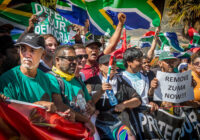With its diaspora bond drive, Nigeria should scrutinize the way Western Union and MoneyGram conduct their business within its borders.
Invest money and invest in your country too. That is the simple proposition behind the Nigerian government’s new diaspora bond, which hopes to entice citizens living abroad to help fund infrastructure projects and tackle a $25 billion (record) deficit budget. To date, the five-year bond has raised $300 million. In the wake of the G20 meeting, where Africa’s development was high on the agenda, the initiative shows how bottom-up approaches to aid can often be more effective than campaigns driven by outside actors.
Yet despite success stories, multiple obstacles still prevent governments in developing nations from holding successful bond campaigns. Countries considering diaspora bond initiatives often have to consider why they have such a significant diaspora in the first place.
The strategy — first pioneered by Israel and India — can work well when non-resident citizens still support their countries of origin and hold assets there. In such cases, diaspora bonds are an excellent way to leverage patriotism to raise low-cost capital. When migrants have escaped oppressive regimes, endemic corruption or economic mismanagement, though, they are much less likely to want to fund the regime that holds power in their home countries, and far more skeptical about the prospect of earning any return on their investment.
Because of these issues — combined with general lack of awareness of the product in some diaspora communities — bond drives by the governments of Kenya and Ethiopia have had disappointing results. As Liesl Riddle, a George Washington University professor who specializes in diaspora financing, has pointed out: “Many governments need to really look at themselves in the mirror, as to what has been their historic relationship with their diaspora and use that reality in their calculation when they offer investments.”
In any case, there is likely a better way to increase the flow of funds into African economies from compatriots abroad: moving to end anti-competitive practices by dominant money transfer operators (MTO) and leveraging the power of remittances. Remittances contribute far more to family budgets, and by extension government coffers, than foreign aid and diaspora bonds combined: remittances sent to all nations in 2012 totaled $534 billion, three times more than aid funds sent to developing countries.
SENDING MONEY OVERSEAS
Nigeria is a prime example of this dynamic. According to the latest report from the International Fund for Agricultural Development, over the past decade remittances to and within Africa have grown by 36% to reach $60.5 billion in 2016 — nearly a third of which was channeled to Nigeria, making it among the biggest recipients of remittances in the world. For 19 African nations, including Nigeria, this flow of money represents 3% or more of their GDP, and for six more — Liberia, The Gambia, the Comoros, Lesotho and Senegal — remittances account for more than 10% of national GDP.
It’s clear that remittances are a critical engine keeping African economies running, but unfortunately they’re still stuck in first gear. For remittances to truly become an unbridled driver of investment and growth, governments across the continent need to undertake regulatory reforms that allow their citizens to leverage what is undeniably a massive and still partially untapped pool of capital.
 Transaction costs for sending and receiving remittances are the highest in Africa, with a 10% average cost to remit $200; fees are highest of all in southern Africa, where they hover at 14.6% on average. In the western part of the continent, thanks in part to greater scale and competition, costs have dropped slightly below the global average to 7.9%, but that’s still far above the global goal of 3%.
Transaction costs for sending and receiving remittances are the highest in Africa, with a 10% average cost to remit $200; fees are highest of all in southern Africa, where they hover at 14.6% on average. In the western part of the continent, thanks in part to greater scale and competition, costs have dropped slightly below the global average to 7.9%, but that’s still far above the global goal of 3%.
The transaction costs have remained unacceptably high despite campaigns to lower them largely because Western Union and MoneyGram have wielded exclusivity agreements and other means to bolster their growing concentration of market share. According to the Overseas Development Institute, these MTOs account for two-thirds of remittance transfers and use anticompetitive agreements with agents and banks to restrict competition, block potential entrants from joining the market, and to continue charging high fees for customers who have few other options.
To be fair, several central banks and competition authorities in Africa have already taken up the issue. In September 2016, Nigeria’s Central Bank reversed a contentious decision that would have severely restricted smaller MTOs from operating in the country. According to the draft directive, MTOs would have had to fulfil strict requirements, including holding a net worth of $1 billion, which would have left only the biggest three MTOs able to operate in the country. While the Central Bank’s decision to backtrack is a welcome one, it could still go much further. The Russian government, for instance, is one of the few that has outlawed exclusivity clauses in money transfers — and not surprisingly, transaction costs are among the lowest worldwide.
African governments would do well to follow Moscow’s example. A powerful way for Nigeria to compound the success of its diaspora bond drive, for instance, would be to scrutinize the way Western Union and MoneyGram conduct their business within its borders. These players are still making far too much off African migrants’ hard-earned remittances, to the detriment of some of the world’s least-developed nations. It’s time that grip was loosened.
The views expressed in this article are the author’s own and do not necessarily reflect Fair Observer’s editorial policy.
Photo Credit: Ppart / Shutterstock.com
Support Fair Observer
We rely on your support for our independence, diversity and quality.
For more than 10 years, Fair Observer has been free, fair and independent. No billionaire owns us, no advertisers control us. We are a reader-supported nonprofit. Unlike many other publications, we keep our content free for readers regardless of where they live or whether they can afford to pay. We have no paywalls and no ads.
In the post-truth era of fake news, echo chambers and filter bubbles, we publish a plurality of perspectives from around the world. Anyone can publish with us, but everyone goes through a rigorous editorial process. So, you get fact-checked, well-reasoned content instead of noise.
We publish 2,500+ voices from 90+ countries. We also conduct education and training programs
on subjects ranging from digital media and journalism to writing and critical thinking. This
doesn’t come cheap. Servers, editors, trainers and web developers cost
money.
Please consider supporting us on a regular basis as a recurring donor or a
sustaining member.
Will you support FO’s journalism?
We rely on your support for our independence, diversity and quality.






